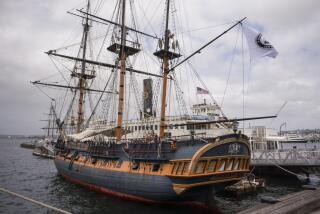Sea Dangers : THE AFFAIR OF THE SOMERS by Philip McFarland (Schocken: $19.95; 320 pp., illustrated)
- Share via
The mutiny aboard the USS Somers obsessed seafaring America, the popular press, and notable literary figures during the early 1840s. More than a simple sea epic, Philip McFarland’s “Sea Dangers” is an inquiry into the relationship of character and courage. Along the way, he brings to life such colorful individuals as James Fenimore Cooper, Washington Irving, Herman Melville, Henry Wadsworth Longfellow and Richard Henry Dana, all of whom were deeply immersed in the wake of the Somers.
Briefly, the Somers mutiny (like the Essex among New England whalers, the Somers was not a subject of polite conversation among naval officers through most of the last century) centers on the personalities of Capt. Alexander Slidell Mackenzie and Acting Midshipman Philip Spencer.
A protege of the much-beloved Irving, who encouraged his literary talents as he himself later encouraged Longfellow, Mackenzie commanded an overcrowded brig-of-war with a green crew on a training cruise in the south Atlantic. The Somers, fore-and-aft a little longer than a regulation basketball court and with its broadest beam just 25 feet, was a novel experiment in naval education in the days before the Academy on the Severn.
Midshipman Spencer at 18 had already established a reputation as a lazy, gifted dreamer, bounced out of several colleges and with a rumored fondness for the bottle. Still enthralled with childhood tales of pirates and Red Rovers, he yearned for adventure, but instead ended his life hanged by the yardarm for mutiny. Alive, he had been the exasperation of his father; dead, young Philip became an albatross to Mackenzie--for his bereaved father was John Canfield Spencer, the U.S. secretary of war.
Was young Spencer really a mutineer? Was he, as the late Samuel Eliot Morison contemptuously asserts, the worst sort of spoiled young punk who got precisely what he deserved? Did his romantic fantasies have grounding in fact? Was the Somers saved only by Mackenzie’s swift action?
Or, did the captain overreact to simple childishness? Was his summary investigation--at which Spencer and his fellow accused were neither present nor ever allowed to confront their accusers--wise, prudent or even legal? Was Mackenzie guilty of bad judgment . . . or of murder?
These questions form the basis of McFarland’s investigation. Since there were both court of inquiry and court-martial, “Sea Dangers” could very easily have bogged down in tedious sifting through transcripts. Fortunately, McFarland chose to view the case in relation to the larger world, which included apocalyptic Millerites, the suppression of the African slave trade, the efforts of fledgling abolitionists, and an apparent murder which spawned the anti-Masonic party.
The Somers case became a cause among the literary elite--and, as such, a cautionary tale for book reviewers. Several years earlier, Mackenzie, with the urging of the Perry family, had written a critical review of James Fenimore Cooper’s recently published history of the Navy, charging that the author did not treat the conduct of the late Oliver Hazard Perry as strongly as he ought. Rightly or wrongly, Cooper, who had frankly needed the money, blamed Mackenzie’s knocks for poor sales. The Somers incident gave the creator of Leatherstocking his opportunity for revenge, which Cooper pursued with both zest and a fine eye for numerous inconsistencies. At the same time, Dana and Melville (who later based “Billy Budd” on the mutiny) supported the captain’s conduct.
As a portrait of a turbulent time, as naval history, as human tragedy, and as proof that the authors of American classics sometimes breathed fire and brimstone, “Sea Dangers” is a tremendous success.
More to Read
Sign up for our Book Club newsletter
Get the latest news, events and more from the Los Angeles Times Book Club, and help us get L.A. reading and talking.
You may occasionally receive promotional content from the Los Angeles Times.










